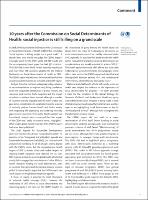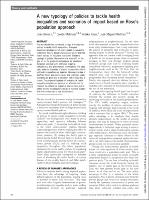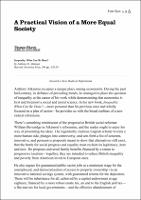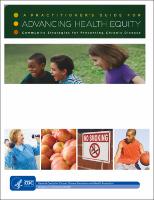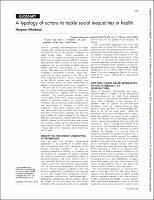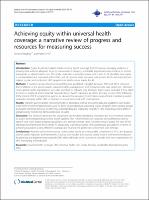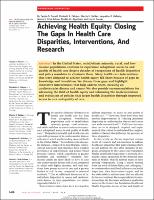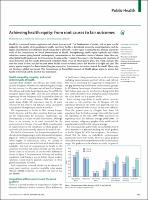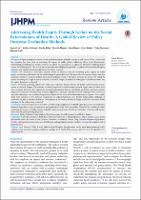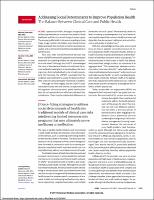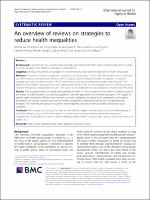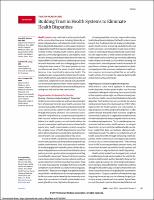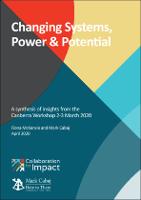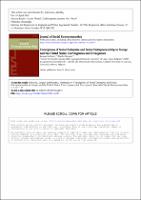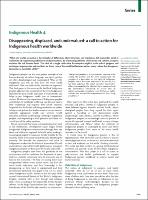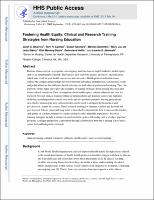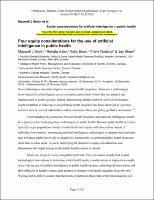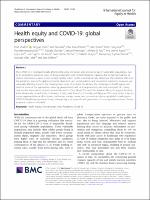Browsing 1.02 Policies & Actions by Resource Type "journalArticle"
Now showing items 1-20 of 33
-
A new typology of policies to tackle health inequalities and scenarios of impact based on Rose's population approach
(Journal of Epidemiology and Community Health, 2013)
The last decade has witnessed a surge in interest for policies to tackle health inequalities. Adequate theoretical development of policy models is needed to understand how to design and evaluate equity-oriented health policies. In this paper we review Graham’s typology of policies (focused on the worst-off, on the gap, or on the gradient) and propose an adaptation (targeted, universal with additional targeting, redistributive, and proportionate universalism). For each type, potential scenarios of impact on population health and health inequalities ... -
A Practical Vision of a More Equal Society
(2015)
Toward a New Radical Reformism Anthony Atkinson occupies a unique place among economists. During the past half-century, in defiance of prevailing trends, he managed to place the question of inequality at the center of his work while demonstrating that economics is first and foremost a social and moral science. In his new book, Inequality: What Can Be Done?—more personal than his previous ones and wholly focused on a plan of action—he provides us with the broad outlines of a new radical reformism. -
A Practitioner’s Guide for Advancing Health Equity: Community Strategies for Preventing Chronic Disease
(2013)
The intention of A practitioner’s guide for advancing health equity is to help practitioners and leaders incorporate a health equity view in their collaborations with community organizations. It offers ideas — with stories to illustrate — for how public health organizations can develop competency in the important work of building organizational capacity, engaging communities, developing partnerships and coalitions, and making the case for health equity. Each of the four sections of the Practitioner’s guide (1. foundational skills, 2. tobacco-free ... -
A typology of actions to tackle social inequalities in health
(Journal of Epidemiology & Community Health, 2007) -
Achieving equity within universal health coverage: a narrative review of progress and resources for measuring success
(2014)
Introduction: Equity should be implicit within universal health coverage (UHC) however, emerging evidence is showing that without adequate focus on measurement of equity, vulnerable populations may continue to receive inadequate or inferior health care. This study undertakes a narrative review which aims to: (i) elucidate how equity is contextualised and measured within UHC, and (ii) describe tools, resources and lessons which will assist decision makers to plan and implement UHC programmes which ensure equity for all. Methods: A narrative review ... -
Achieving Health Equity: Closing The Gaps In Health Care Disparities, Interventions, And Research
(2016)
In the United States, racial/ethnic minority, rural, and lowincome populations continue to experience suboptimal access to and quality of health care despite decades of recognition of health disparities and policy mandates to eliminate them. Many health care interventions that were designed to achieve health equity fall short because of gaps in knowledge and translation. We discuss these gaps and highlight innovative interventions that help address them, focusing on cardiovascular disease and cancer. We also provide recommendations for advancing ... -
Achieving health equity: from root causes to fair outcomes
(The Lancet, 2007) -
Addressing Health Equity Through Action on the Social Determinants of Health: A Global Review of Policy Outcome Evaluation Methods
(Kerman University of Medical Sciences, 2018-02-06)
Background: Epidemiological evidence on the social determinants of health inequity is well-advanced, but considerably less attention has been given to evaluating the impact of public policies addressing those social determinants. Methodological challenges to produce evidence on policy outcomes present a significant barrier to mobilising policy actions for health equities. This review aims to examine methodological approaches to policy evaluation of health equity outcomes and identify promising approaches for future research. Methods: We conducted ... -
An overview of reviews on strategies to reduce health inequalities
(2020-12)
Background: Governments are incentivized to develop and implement health action programs focused on equity to ensure progress with effective strategies or interventions. Objective: Identify and synthesize strategies or interventions that facilitate the reduction of health inequalities. Methods: A systematic search strategy was carried out up until August 2019 in MEDLINE (Ovid), Embase (Elsevier), Cochrane Database of Systematic Reviews, LILACS, Scopus, Scielo and Epistemonikos. In addition, a snowball strategy was used. Literature reviews (LRs) ... -
Building Trust in Health Systems to Eliminate Health Disparities
(JAMA, 2019-07-09) -
Changing Systems, Power & Potential
(2020-03)
Mark Cabaj, President of the Canadian consulting company From Here to There and an Associate of Tamarack – An Institute for Community Engagement, worked with CFI to deliver a two-day workshop in March 2020 on Changing Systems, Power and Potential. CFI Network member Fiona McKenzie observed and synthesised the learnings, discussions and perspectives into a report which captures contributions from both presenters and participants. The result is a blend of concepts, frameworks, applications, hints and common threads that emerged about efforts to ... -
Conceptions of Social Enterprise and Social Entrepreneurship in Europe and the United States: Convergences and Divergences
(Journal of Social Entrepreneurship, 2010)
The concepts of social enterprise and social entrepreneurship are making amazing breakthroughs in EU countries and the United States. Until recently, the debates on both sides of the Atlantic have taken place in parallel trajectories with few connections among them. In the first part of the paper, we describe the European and US historical landscapes in which those concepts took root. In the second part, we analyse how the various conceptualizations have evolved. This analysis paves the way for the third part, in which we highlight the conceptual ... -
Equity, Diversity & Inclusion: A resource guide for Leaders in Collegiate Recreation
(NIRSA Commission on Equity, Diversity & Inclusion, 2019-02)
The publication, Equity, Diversity & Inclusion: A resource guide for Leaders in Collegiate Recreation, compiles foundational concepts, research-driven best practices, and case studies to help campus recreation professionals develop competencies around EDI – for their own personal and professional growth, as well as for their departments. The publication includes the following: Introduction to equity, diversity, and inclusion and the NIRSA EDI Identity Wheel. Definitions for a broad range of terminology associated with the nine identities focused ... -
Fostering Health Equity: Clinical and Research Training Strategies from Nursing Education
(The Kaohsiung Journal of Medical Sciences, 2009)
Racism, ethnocentrism, segregation, stereotyping, and classism are tightly linked to health equity and social determinants of health. They lead to lack of power, money, resources, and education which may result in poor health care access and outcomes. Health profession faculties must address the complex relationships that exist between individual, interpersonal, institutional, social and political factors that influence health outcomes in both clinical and research training. Thus, the purposes of this paper are to provide examples of training ... -
Health equity and COVID-19: global perspectives
(2020-12)
The COVID-19 is disproportionally affecting the poor, minorities and a broad range of vulnerable populations, due to its inequitable spread in areas of dense population and limited mitigation capacity due to high prevalence of chronic conditions or poor access to high quality public health and medical care. Moreover, the collateral effects of the pandemic due to the global economic downturn, and social isolation and movement restriction measures, are unequally affecting those in the lowest power strata of societies. To address the challenges to ...

